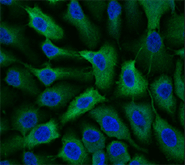Researchers from the Universities of Bristol and Birmingham, who have been studying breast and prostate cancer cells, show how manipulating PRH’s levels in cancer cells can hinder their ability to penetrate into neighbouring environments, potentially preventing them from entering nearby blood vessels. The findings could lead to new ways of combating the spread of the disease in multiple cancers.
PRH belongs to a group of proteins known as ‘transcription factors’, meaning its role is to interact with DNA to ‘switch’ particular genes ‘on’ or ‘off’. Scientists have been aware of PRHs’ role in controlling cell growth and specification for some time. For example, it is essential for the healthy development of foetuses but this is the first time PRH has been implicated in the movement of cancer cells.
After growing normal and cancerous breast and prostate cells in the laboratory the team used genetic techniques to either increase or decrease PRH levels. The team then examined the cells and found that without PRH, the cells migrated much faster, and were able to invade through a porous gel more efficiently.
The researchers show that PRH is responsible for ‘switching on’ another protein called Endoglin, which has also been shown to be important in cell migration. The low levels of PRH found in cancer cells leads to low levels of Endoglin, and therefore results in increased cell migration and enhanced invasion. Interestingly, adding additional Endoglin to cancer cells with no PRH was sufficient to reduce their migration and invasion.
Dr Kevin Gaston, co-author of the study and Reader at Bristol’s School of Biochemistry in the Faculty of Medical and Veterinary Sciences, said: “It is not simply the growth of cancers but their ability to move to multiple locations in the body that makes the disease so deadly. PRH transcription factor inhibits the migration of normal and cancerous breast cells and prostate cells and this represents a novel mechanism that could be important in multiple cancers.”
Dr Padma-Sheela Jayaraman, co-author of the study and Senior Lecturer at the University of Birmingham, said: “Here we show for the first time that the PRH transcription factor inhibits the migration of normal and cancerous breast cells and prostate cells. This work reveals exciting new targets for future translational research.”
Importantly, as this mechanism appears to apply to more than one cancer type, PRH regulation of Endoglin may represent a novel method for controlling migration that could potentially be exploited to treat multiple cancers.
Katherine Woods, Research Information Manager at Breast Cancer Campaign, said: “This interesting work has brought us another step closer to understanding how breast cancer cells move and spread around the body, and closer to knowing how we could stop this spread to help women outlive the disease. This research is all the more valuable because it could have implications for other cancers such as prostate and thyroid cancer, and some leukaemias.”
The Breast Cancer Campaign-funded study is published in the journal Oncogene. A University of Bristol studentship and a MRC Studentship held at the University of Birmingham also helped fund this work.
